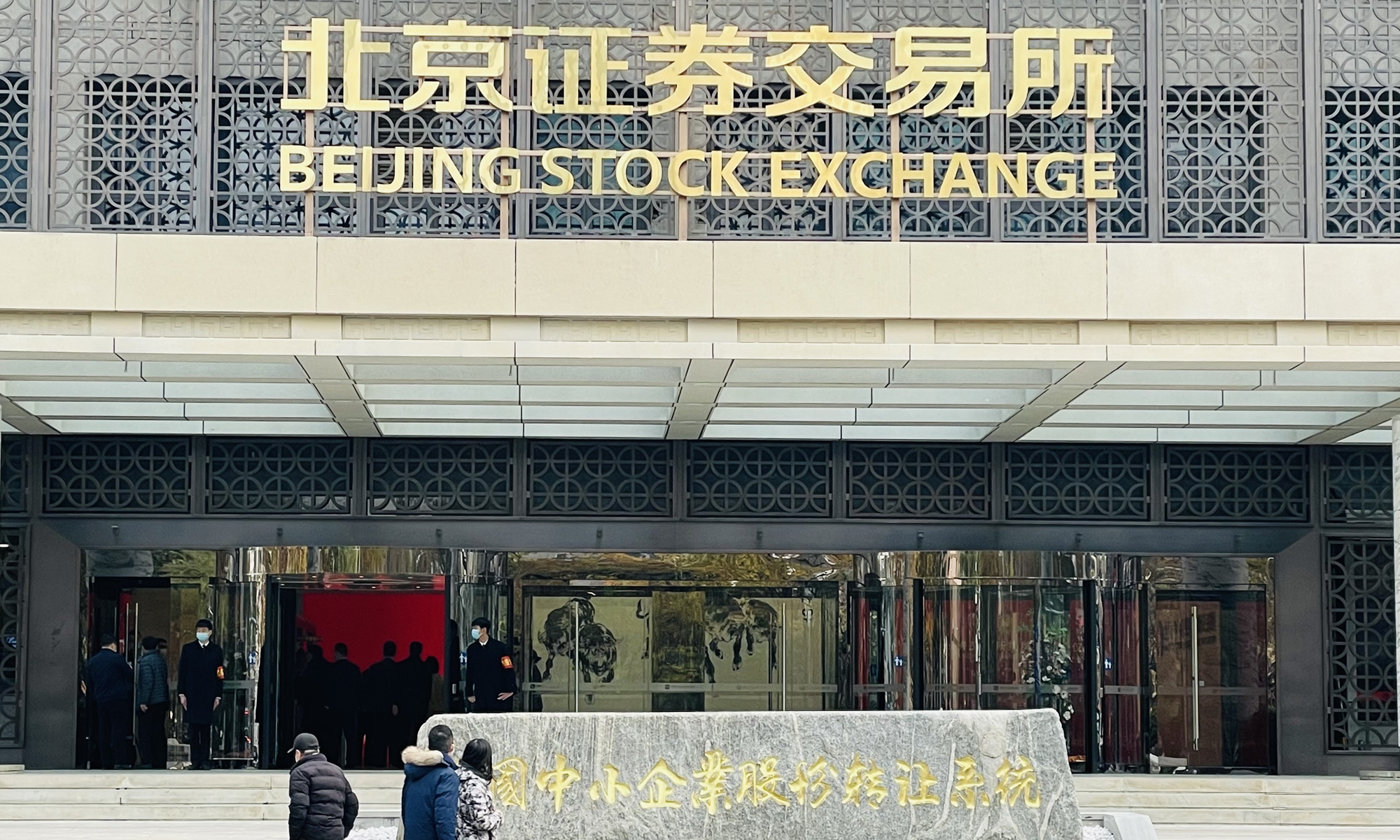
Beijing Stock Exchange Photo:Chi Jingyi/GT
The Beijing Stock Exchange's (BSE) benchmark index, also known as the BSE 50 Index, closed 2.55 percent higher on its debut on Monday, as the third-born of the A-share market took another major step to foster innovative small businesses in the world's second-largest economy.
The index for the exchange, which is just more than one year old, opened 2 percent higher and closed 2.55 percent higher at 1,028.72 points. The base value was set as 1,000.
The index also outperformed its counterparts, with China's benchmark Shanghai Composite Index down 0.39 percent, while the Shenzhen Component Index fell 0.41 percent. Shanghai's tech-heavy STAR 50 Index ended flat for the day, while Shenzhen's similar ChiNext Index fell 0.1 percent.
"The index launch is a major event for the bourse, and it's a signal that the exchange has a certain amount of customer resources, mature trading structures, and a large number of trading categories," Chen Jia, a veteran market watcher, told the Global Times on Monday.
The Beijing bourse will take the index "as the core", explore and launch various characteristic indexes in line with market development, and establish more index funds, read a statement on its website on Monday.
The index has 50 stocks considered to be representative of the market, providing a tool to "monitor the overall performance of the BSE for all sides," general manager Sui Qiang said on November 18.
Chen said that the index's better-than-expected debut gave the financial market strong confidence and highlighted the unique advantage of the index in the A-share market.
The BSE was launched on November 15 last year to serve the innovation and development of smaller firms. It became the "third child" of China's A-share market, in addition to the Shenzhen and Shanghai bourses, both of which are now in their early 30s.
The exchange now has 123 listed companies and has raised 26.8 billion yuan ($3.8 billion). Medium and small-sized firms account for 77 percent, while private enterprises take up 86 percent.
"The Beijing Stock Exchange has operated smoothly and seen improvements in its ability to serve the innovative development of medium and small-sized businesses one year after it began trading," said the bourse on its first anniversary.
Market observers told the Global Times that launch of the index also underscored China's determination to support the large number of small, medium-sized and micro-sized private enterprises and specialized and innovative companies under the current international complexity and global economic woes.
Most listed firms, including 49 "little giant" companies - small enterprises specializing in niche markets with cutting-edge technologies and great potential - are in the sectors of high-end equipment manufacturing, new energy, software, hardware technologies, and new materials.
According to the Xinhua News Agency, in the first three quarters of this year, listed companies on the Beijing bourse reported steady revenue growth despite the COVID-19 resurgence and volatile international situation.
Their combined operating revenue totaled 73.21 billion yuan from January to September, up 33.25 percent year-on-year, with net profits reaching 6.93 billion yuan, a year-on-year increase of 19.43 percent.
The index will on the other hand promote the entry of index products into the market, which will further enrich the number and structure of investors in the Beijing bourse, and offer more ordinary investors a chance to share the growth dividends of innovative SMEs, Guo Shiliang, a financial commentator, told the Global Times on Monday.
The most important thing is to improve liquidity in the market, and valuation, pricing and price discovery functions will improve, Guo said.
So far this year, 50 companies raised a total of 10 billion yuan via IPOs on the Beijing bourse, according to Reuters, citing Refinitiv data. In contrast, more than 100 companies raised 203.5 billion yuan on Shanghai's tech-focused STAR Market, while 164 billion yuan was raised on Shenzhen's start-up board ChiNext via 133 IPOs.
The bourse is also attracting foreign investors. Mandy Zhu, head of China global banking at Swiss bank UBS, told Reuters that the bank has little business exposure to the Beijing bourse yet but is closely monitoring its development.




